|
Rotten Library > Conspiracy > Special Forces Underground
Special Forces Underground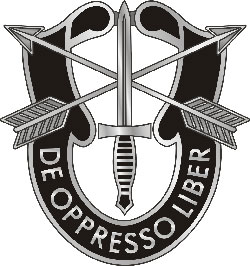 It's the heartwarming story of a far-right, lunatic-fringe, conspiracy-peddling Special Forces bigot, the Pentagon's ridiculous failure to stop soldiers at Fort Bragg from passing around his racist newsletter, and the professional militia he claims is waiting for an order to overthrow the corrupt U.S. federal system via military coup in favor of some God-awful dystopic vision of White Power governance.
It's the heartwarming story of a far-right, lunatic-fringe, conspiracy-peddling Special Forces bigot, the Pentagon's ridiculous failure to stop soldiers at Fort Bragg from passing around his racist newsletter, and the professional militia he claims is waiting for an order to overthrow the corrupt U.S. federal system via military coup in favor of some God-awful dystopic vision of White Power governance. The few and the proud, the racist and murderous, a shadowy elite of U.S. soldiers... The story of the Special Forces Underground is a tale so bizarre it has to be true.
In 1977, he managed to qualify for the Special Forces, the U.S. Army's elite fighting force where everyone has a "secret" security clearance and peak physical fitness. Emotional stability and a healthy respect for the U.S. government are apparently not on the list of requirements, as will become increasingly apparent while reading this story.
Barry himself is a man of colorful habits, which might seem inconsistent with membership in the most elite fighting force that the American military has to offer. A San Diego newspaper reporter described a visit with Barry in 2000:
Barry wore a kilt and no shirt -- his usual attire at home. In 1985, Barry left the Army to become a solider of fortune, as reported, appropriately enough, by Soldier of Fortune magazine. Among his projects during this period was a trip to the Philippines, where he took on "contract work" of a presumably unsavory sort for an unspecified employer in 1988. Some have speculated that his assignment might have involved government death squads active at the time, which efficiently terminated threats to Philippines national security such as poverty-stricken farmers seeking a living wage, and other likeminded communists.
Rotten.com draws no conclusions from the preceding paragraph. Any dark intimations of weird and illicit connections which you might imagine are strictly your own problem and without a doubt entirely coincidental. Barry returned to the U.S. where he first took up publishing as a career, briefly putting out an anti-Vietnamese newsletter in California before returning to his roots as a redneck and a military officer. He was welcomed back into the Special Forces in 1989, where he spent the next several years.
The next day, Barry, who made a good living as an employee of the federal government, came up with the idea that he should publish a newsletter dedicated primarily to overthrowing the federal government from which he made a good living. However, he didn't act on the impulse until the Waco siege, an event which would prove important to Barry's career on multiple fronts. Barrry ingeniously decided to name his resistance newsletter The Resister, not to be confused with the South African anti-apartheid newsletter of the same name (not that anyone would). He wrote under the nom de guerre J.F.A. Davidson. The bulk, if not all, of The Resister's content consisted of Barry's florid prose. The first issue of The Resister, surnamed The Political Warfare Journal of the Special Forces Underground appeared in the summer of 1994 and was distributed to an elite group of paying supporters as "gray copies". Those who received the newsletter were encouraged to pay it forward by distributing mimeographed "white copies". The newsletter claimed to be serving an audience primarily made of up of Special Forces soldiers -- both veterans and active-duty -- and the initial subscriber roll was estimated at somewhere between a couple hundred and a couple thousand names. According to Issue One, the "pro" column of the mission statement of The Resister wasn't terribly disturbing on the face of it.
The philosophy of The RESISTER is straightforward: strict constitutionalism, isolationism, laissez-faire capitalism, individual rights, limited government, and republicanism. While some might quibble with the politics, the general principles here aren't too dramatically different from the stated beliefs of the Pat Buchanan wing of the Republican Party. When you get to the "con" column, however, the code words start to blossom like mushrooms in a dung pie.
The RESISTER opposes statism, liberalism, tribalism, socialism, collectivism, internationalism, democracy, altruism, pull politics, and the New World Order. In an essay opposing democracy, The Resister reported that Special Ops soldiers had been polled on whether they would be willing to confiscate weapons from the American public (in violation of the law, though the survey didn't specify that). As it turns out, the allegation was true, and the second issue contained a much more detailed report.
In part because of Barry's leaks to the media (first to Soldier of Fortune then later to more credible outlets), the story of Special Forces participation became widely known and was eventually substantiated in the mainstream press. Special Forces commanders consulted with the FBI over the plan and also allowed Delta Force commandos to be on the scene during the disastrous raid on the Branch Davidian compound.
In addition to featuring actual insider news, The Resister benefited from its colorful and reasonably competent prose, as well as its coverage of the hot issues among white supremacists of the day -- mainly Waco, but extending to every criticizable form of government activity from migratory bird protections to accusations of child porn fetishes among ATF agents. Soon, the "underground" newsletter was a hit at gun shows and armed compounds around the country. Later editions became more radical and openly racist:
Personally, I am sick and tired of listening to Jews whine and kvetch about their Holocaust®, and when I am afflicted by it my reaction ranges, depending upon how much tolerance I was graced with that day, from studied indifference to remarking that, if killing Jews was the Germans' aim for locking them up they were uncharacteristically inefficient about the whole thing and criminally wasteful with precious logistics in time of war, because all the Germans had to do was lock the Pests in efficiently dehumidified and comfortably heated barracks for five days unfed and let them die of thirst.If that wasn't clear enough: Surgeon General David Satcher, the second Bell Curve proof that Negroes must never be permitted to practice medicine on Whites, recently declared that Negro propensity for puerile and violent behavior is, according to the Jewish operated Associated Press, one of the "leading health indicators -- that address a broad range of health and, one might argue, social concerns." (Emphasis added.) No kidding.
By sheer chance -- doubtless a meaningless and arbitrary coincidence and proof that God does indeed play dice with the universe -- one of the SoF copies of The Resister made its way to a young man named Timothy McVeigh, who was also obsessed with Waco. (Interestingly, McVeigh claimed to friends at various times that he was recruited into a secret underground organization while trying out for Special Forces at Fort Bragg, where Barry had been stationed periodically and near which he had set up housekeeping.) When McVeigh blew up the Alfred E. Murrah building on 19 April 1995, he left a stash of extremist literature in his car for authorities to find. Stuffed into the envelope was his beloved copy of The Resister. Less than two weeks after the bombing, "J.F.A. Davidson" appeared on 60 Minutes, shrouded by dim lights and electronic voice filtering. Ominously, he told the reporter that the U.S. government was "the enemy" and that his super-secret organization's most powerful tool was its super-secrecy, apparently not thinking through how appearing on 60 Minutes might defuse that particular weapon. As recounted by a Southern Poverty Law Center report on the SFU, the interview was strikingly cartoonish.
Introducing Barry's "political warfare journal," Kroft told his listeners that it used "the same inflammatory rhetoric espoused by the radical militia movement and portrays the U.S. government as the enemy." Not surprisingly, the televised appearance was the beginning of the end of the Special Forces Underground, at least in its overground capacity. The first stage of political scandal is denial, and the Pentagon leapt into action immediately after 60 Minutes hit the air.
First of all, there are lots of underground publications in this country that bill themselves as a lot of things, so I don't know that I would, immediately, accept the premise of the publication's masthead.
In December 1995, three soldiers stationed at Fort Bragg murdered a black couple near the installation. One of the soldiers had been well-known as a white supremacist and a copy of The Resister was said to have been found in his locker. Another soldier came forward to complain that Barry had given him a copy of The Resister in the Bragg parking lot. The accumulation of incidents prompted a congressional probe into extremism among military personnel. Clearly, swift and strong action was called for. The Army swiftly and strongly reprimanded Barry and imprisoned him in a desk job, sans security clearance, then swiftly and strongly stonewalled all inquiries from Congress and the press. Congress didn't go away, so the military investigated further. After identifying some of Barry's collaborators and sources, some soldiers were transferred out of Bragg and others were warned off of cooperating. No one was charged with anything, despite leaks of classified information and the increasingly extremist tone of a newsletter which did -- let us not forget -- declare itself an enemy of the U.S. federal government on the very first page of its premier issue.
But it was not the end of The Resister. Not quite yet. Freed from whatever constraints the military didn't place on him, Barry took the newsletter -- and his life -- in an increasingly wacko-racist-Nazi direction, including associating with some of the more prominent white supremacist groups in the U.S., such as the League of the South and the National Alliance, while contributing to Resistance Magazine, a journal mixing Nazi-love, racial hate and rock-n-roll into a simply bizarre concoction. Barry briefly served as the Alliance's "military unit coordinator," according to the SPLC. Among his colleagues in the movement is attorney Kirk Lyons, who has represented and befriended such white power celebrities as Andreas Strassmeir, a much-talked-about but never-convicted-of-anything suspect in the Oklahoma City bombing. (Coincidence.) By 2001, Barry appeared to have vacated the Alliance post, although he remains a much sought-after speaker at White Power events. As for The Resister, it ceased publication somewhere around 2001. You might think that this was the result of Barry's arrest or some sort of government crackdown, but you would -- of course -- be wrong. A 2005 message board thread wondering "whatever happened to the Special Forces Underground" was met by a cryptic anonymous response:
Found you folks by accident...decided that underground should actually mean underground...although pop-up occur from time-to-time. The revolution will be VOIPed AND blogged.Of course, this is (presumably) from a man who thought that underground might reasonably include announcing the existence of his organization on national TV. In fact, the Special Forces Underground didn't burrow very far at all. Even as he folded up The Resister, Barry was unfolding the Major General Edwin A. Walker Society, named for a general who had been discharged in the 1960s for being a member of the John Birch Society and who had, somewhat improbably, been the victim of an assassination attempt by Lee Harvey Oswald a few months before the successful assassination of John F. Kennedy. (A vocal segregationist, Walker's last big public event was an indecent exposure in a public restroom during the freewheeling 1970s.)
While still not, strictly speaking, "underground," the MG Walker Society has done a remarkably good job of moving the SFU back into the shadows and away from the scrutiny of lawmakers and military investigators. (FOIA requests by this reporter to both the military and the FBI received responses to the effect of "never heard of it.")
The MG Walker Society has accomplished one minor feat vis-a-vis "remaining underground" -- no issues of The Resister since 2000 appear to have surfaced online, and as best Rotten.com can ascertain, not a single issue of the Periodic Intelligence Report has ever made its way into the press or onto the Internet. However, if you look really hard, you can find some grousing on White Power message boards about the Society asking for more and more money while publishing fewer and fewer actual products. If the feds can't nail the SFU for hate crimes, leaking national security information or conspiring and inciting to overthrow the government -- well, there's always mail fraud.
|
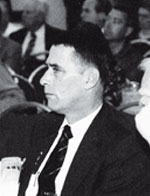 Steven Barry, the group's self-proclaimed founding father, possesses a service record full of ups and downs. By most accounts, Barry's skills and education as a military scientist and specialist in unconventional warfare fall somewhere between competent and brilliant. But after washing out of Ranger school and West Point, he was forced to pursue the enlisted route to military advancement.
Steven Barry, the group's self-proclaimed founding father, possesses a service record full of ups and downs. By most accounts, Barry's skills and education as a military scientist and specialist in unconventional warfare fall somewhere between competent and brilliant. But after washing out of Ranger school and West Point, he was forced to pursue the enlisted route to military advancement. 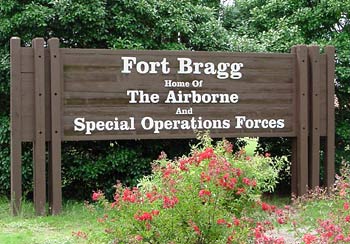 With advanced training as a sniper and in military intelligence, Barry became an instructor at the John F. Kennedy Special Warfare and School in Fort Bragg, North Carolina, an institution which proudly proclaims it "leads the way" in "creating the world’s finest special operations forces" -- the Green Berets.
With advanced training as a sniper and in military intelligence, Barry became an instructor at the John F. Kennedy Special Warfare and School in Fort Bragg, North Carolina, an institution which proudly proclaims it "leads the way" in "creating the world’s finest special operations forces" -- the Green Berets. The Philippines has had no shortage of death squads in its troubled modern history. The squads of the 1980s had the distinction of being funded by the
The Philippines has had no shortage of death squads in its troubled modern history. The squads of the 1980s had the distinction of being funded by the 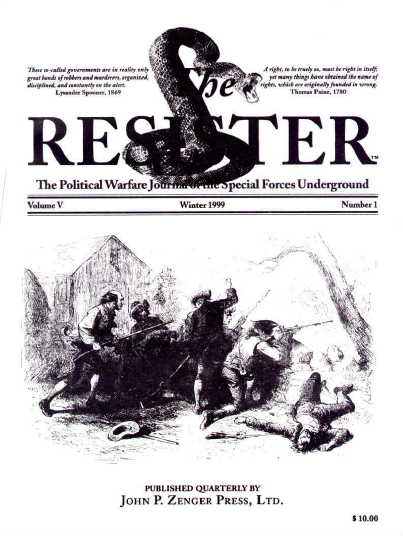 By his own account, Barry was apparently just your run-of-the-mill, race-baiting, Camel-smoking, whiskey-drinking, gun-loving, former-death-squad-working, bekilted elite military killing machine up until August of 1992, when he became outraged by the
By his own account, Barry was apparently just your run-of-the-mill, race-baiting, Camel-smoking, whiskey-drinking, gun-loving, former-death-squad-working, bekilted elite military killing machine up until August of 1992, when he became outraged by the 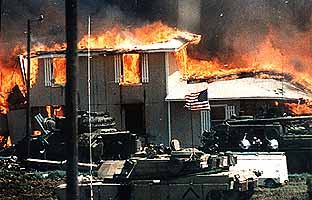 The newsletter also intimated that Delta Force members had advised the FBI on how to conduct the Waco raid. This allegation also turned out to be true and was the subject of reports in subsequent issues of The Resister, which spiraled into a full-scale scandal.
The newsletter also intimated that Delta Force members had advised the FBI on how to conduct the Waco raid. This allegation also turned out to be true and was the subject of reports in subsequent issues of The Resister, which spiraled into a full-scale scandal. 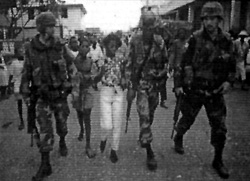 Barry also leaked an apparently true (but officially denied) story that some Special Forces soldiers mutinied against their orders to disarm right-wing Haitian rebels during the 1994
Barry also leaked an apparently true (but officially denied) story that some Special Forces soldiers mutinied against their orders to disarm right-wing Haitian rebels during the 1994 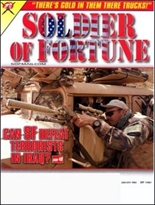 Soldier of Fortune writer James Pate helped The Resister increase its influence rapidly. In addition to performing small but unjournalistic favors
for Barry, such as renting a post office box for use by The Resister staff and assisting with typesetting, Pate benefited from Barry's tips about shady dealings among Special Forces soldiers past and present. Eventually, the relationship grew and SoF distributed a sample copy of The Resister to its readers.
Soldier of Fortune writer James Pate helped The Resister increase its influence rapidly. In addition to performing small but unjournalistic favors
for Barry, such as renting a post office box for use by The Resister staff and assisting with typesetting, Pate benefited from Barry's tips about shady dealings among Special Forces soldiers past and present. Eventually, the relationship grew and SoF distributed a sample copy of The Resister to its readers. 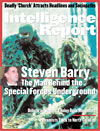
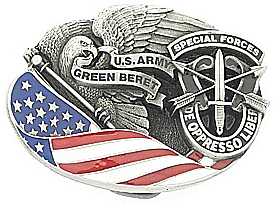 Needless to say, this official statement turned out to be a load of crap. Outwardly pooh-poohing the minor media frenzy following the report, the Pentagon began quietly investigating the SFU. Given the short-attention span of American journalists, the investigation was not placed on the front-burner... until The Resister popped up in the middle of yet another embarrassing incident.
Needless to say, this official statement turned out to be a load of crap. Outwardly pooh-poohing the minor media frenzy following the report, the Pentagon began quietly investigating the SFU. Given the short-attention span of American journalists, the investigation was not placed on the front-burner... until The Resister popped up in the middle of yet another embarrassing incident.
 Barry retired at the end of 1997, without so much as a fine, but in firm possession of a pension and a generous military benefits package.
Barry retired at the end of 1997, without so much as a fine, but in firm possession of a pension and a generous military benefits package. 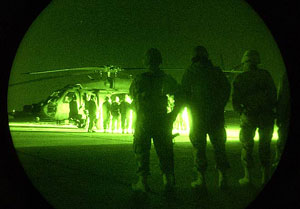 The MG Walker Society describes itself as "an anti-Communist organization of active duty and retired soldiers who, in the spirit of Major General Edwin A. Walker, are combating Bolshevism and Bolshevist influences within the military." Communism is defined here, loosely, as anything having to do with the current United States government.
The MG Walker Society describes itself as "an anti-Communist organization of active duty and retired soldiers who, in the spirit of Major General Edwin A. Walker, are combating Bolshevism and Bolshevist influences within the military." Communism is defined here, loosely, as anything having to do with the current United States government. 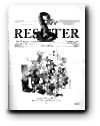 The MG Walker Society still claims to publish The Resister as a 100-page semiannual journal, in addition to a monthly Periodic Intelligence Report, all available for a hefty $220 per year membership fee. Since the SPLC estimates that The Resister at its peak had as many as 3,000 members, even a lower subscription base would still provide quite the comfortable living in small-town North Carolina, where Barry still hangs his kilt a couple miles down the road from Fort Bragg.
The MG Walker Society still claims to publish The Resister as a 100-page semiannual journal, in addition to a monthly Periodic Intelligence Report, all available for a hefty $220 per year membership fee. Since the SPLC estimates that The Resister at its peak had as many as 3,000 members, even a lower subscription base would still provide quite the comfortable living in small-town North Carolina, where Barry still hangs his kilt a couple miles down the road from Fort Bragg.